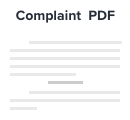-
Network Signatures Inc v. State Farm Mutual Automobile Insurance Company DC CAFC
- 8:11-cv-00982
- C.D. Cal.
- Judge: James V. Selna
+1
- Filed: 06/30/2011
- Closed: 06/14/2012
- Latest Docket Entry: 02/06/2020
- PACER
- Docket updated daily
1
Plaintiff
1
Defendant
1
Accused
Product
1
Patent-in-Suit
351
Days in
Litigation
-
Network Signatures Inc v. State Farm Mutual Automobile Insurance Company DC CAFC
- 8:11-cv-00982
- C.D. Cal.
- Judge: James V. Selna
+1
- Filed: 06/30/2011
- Closed: 06/14/2012
- Latest Docket Entry: 02/06/2020
- PACER
- Docket updated daily
Market Sector
E-commerce and Software
Referred Judge
Assigned Judge
Outcome Summary
- Patent Information
-
Infringement
| Accused Product | Patent # | Claim # | Outcome |
|---|---|---|---|
| Digital certificatesDigital Certificates and Digital SignaturesDigital signatures | US 5,511,122 A | All Asserted Claims |
No infringement
Entry 61Entry 51 |
